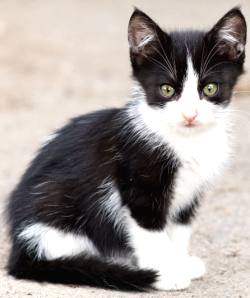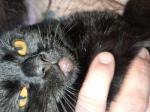Natural Cat Repellent Products
All natural cat repellent products. Do they work?
Using natural cat repellent products, you can keep both your cat and foreign cats out of your yard, and away from your garden.
These are generally non-toxic and biodegradable, and can work outside as repellents for cat urine on the porch, as well as keeping cats away from your property entirely.

Indoors they may be used to keep cats away from plants, or off of furniture.
I have some cautions and there is a downside, however, to using these products.
Just because it says "natural" it doesn't mean that it won't cause a cat some discomfort or harm.
As always, read the labels and documentation on these products and decide for yourself whether or not you think they're OK to use for cats.
When in doubt, ask your veterinarian.
Remember that hemlock is natural, and also poisonous.
Let's start with the downside.
Remember that with natural cat repellent products, pellets, sprays, liquids, and powders will be subject to the elements. They will degrade over time, and faster if used outdoors in bad weather. Some of these products even state that they only work for 24 hours.
So, these products need to be reapplied in order to keep working. Stop the application, and the animals may return.
That means that's one more task you have to perform, and if you don't get to it, the cats will be back. In most climates, the weather will work against you, be it snow in winter, or rain.
Go away for a week or two, and the cats will be back. It also means that over time, this can be an expensive solution. In addition, if you live in an area where there is a lot of rain or the ground is often wet, you'll need to reapply it more often.
Remember that if you're training your cat, you should not only use a deterrent, but also provide an attractive element. So, place the repellent in the area you don't want your cat to go. Place something your cat is attracted to (catnip perhaps) in an area that it's OK for your cat to frequent.
Also, using a loud noise so as to startle the cat (such as hands clapping) and a firm "no" can be used to deter your cat. Eventually, just "no" should work.
Liquid Fence Cat Repellent
Liquid Fence is spray repellent that is made from all natural plant oils, so it's biodegradable and environmentally friendly. It's safe to use around humans and won't harm pets or your garden.
The principle behind this product is that cats (and other animals) will return to the same areas over and over again to urinate and defecate.
This product masks the odors left behind. This causes the animals to become uneasy, thus discouraging them from using the area.
According to the manufacturer, the effectiveness of Liquid Fence all natural cat repellent will last "a week or more and continue to act as a training deterrent for pets and strays as long as it is present."
Initially, in order to break the habit, the product may need to be applied more frequently. Over time and as the animal's behavior changes, the frequency of application can be reduced.
Also. according to the manufacturer, this product has been proven to be effective and is recommended by the National Home Gardening Club.
Shake Away Cat Repellent
One way to keep a cat away from an area is to make the cat think that there is danger in that area. One way to do this would be to put a coyote or a fox in the yard. Since that might be difficult, the next best thing is to put the urine from a coyote or a fox in the yard.
Shake Away Domestic Cat Repellent is a powder form of coyote and fox urine which will make a cat think that one of those animals has staked claim to a territory, or is nearby. Since cats fear foxes and coyotes, they stay away.
You can even use it to prevent cats from getting on top of your car by sprinkling a small amount of the powder on a paper plate and placing it on your car.
This product is all natural and organic and won't harm the animals or grass or plants.
This product is designed to work on domestic cats, including feral cats, neighborhood cats that roam, and strays. It will also repel other small creatures that may not be wanted in the yard or around your house.
This includes raccoons, gophers, and mice. It will not, however, repel dogs, since dogs are more closely related to the predators being used. It also does not work on birds.
Shake Away claims a 90 percent success rate with their natural cat repellent product. People have used it indoors as well.
One thing to note: if you live in an area with foxes, coyotes or wild dogs near by, it may attract them. One additional point that I've heard from people who've used this product is that the odor from the product itself can be unpleasant.
About Silent Roar
Silent Roar is a pellet product that uses lion dung as a natural cat repellent. Not wanting to become a snack for the King of the Beasts, domestic cats wisely stay away.
It is sold in the UK and is advertised as having won a comparison test done by the BBC TV show "Watch Dog." According to the claims, not only is it an effective deterrent, it lasts a long time between applications.
I don't know the current status on this, but according to this site the product is not allowed to be sold due to government regulations. Apparently, spreading lion dung around has some health implications, so the product has to be registered and approved. Who knew?
Using Plants as Natural Cat Repellent
Cats dislike being around certain plants, either due to the smell that they give off or possibly the taste when they nibble. If you'd like to make cat repellent yourself, these can be effective deterrents. That includes the plants themselves, or the leaves, flowers, clippings, or essential oils of these plants.
Rosemary is used in the product Bitter Yuck and works to stop cats from licking wounds or climbing on furniture. If you take some rosemary clippings and place them on window sills or counter tops, you can keep your cat out of these areas. You could also get some rosemary essential oil and treat some cotton balls with it.
Another plant cats dislike is Coleus canina. Coleus canina is called the "scaredy cat plant." Here are some plants that are recommended for keeping cats away from gardens and yards, but possibly could be used indoors as well:
- Coleus canina
- lavender
- pennyroyal
- rosemary
- rue
Remember to never use a plant that is poisonous to cats for this purpose.
Other Natural Cat Repellent Remedies
There are a number of other suggestions that have been made for substances that are natural cat repellents. Many of these may not work, and some of the substances are toxic to cats and other animals.
Orange, lemon, and lime peels can be effective as cats dislike citrus. Cats don't like to walk on rocky/rough surfaces, and they prefer to eliminate on loose soil, so you can use lava rocks or pine cones for mulch in your garden.
Coffee grounds have been suggested on many online forums and by some gardeners, but I don't know anyone who has personally tried this. I've heard that this does not work in many cases.
More importantly, coffee grounds are toxic to cats.
Various home made recipes abound involving mixtures of various ingredients including vinegar, different types of pepper (including white and cayenne), various essential oils, and even sugar.
I'm not sure what effect sugar would have on a cat. Cats have "sweet blindness" and lack the ability to taste sweetness. Since they don't register sugary tastes, they are generally neutral towards sugar. I doubt it would be an effective deterrent. Besides that, it might attract ants or other pests.
In any case, certain essential oils (such as those used in potpourri) can be toxic to cats and pepper may cause extreme discomfort. Some have gone so far as to say that cats will scratch their eyes out if the pain becomes too much. I cannot confirm this, but you certainly don't want to cause pain to an animal so do not use pepper.
The bottom line? You can use an all natural cat repellent and feel good that you're not hurting animals, but effectiveness may vary. You should be aware that what some people are recommending as natural may be that, but it also may harm the animal.
On the other hand, the electronic solutions that are available are probably more effective, require less work, won't harm any animals, and are possibly less expensive long term.
Note: There are many people who have tried both the commercial products and the home made remedies and have been disappointed. If you read the reviews from people who have used electronic/mechanical based products like Cat Stop and Scarecrow, you'll see things like "everyone who has tried them knows that sprays and powders don't work."
This may have been due to environmental conditions, or perhaps they were not diligent enough in their efforts.
In addition, while some of these products state that they will not harm the animals, some of them may contain irritants. Case in point, cayenne pepper and white pepper have been suggested as part of a homemade cat repellent mixture.
Some of these commercial products contain these as well. If you read the MSDS (Material Safety Data Sheets) on some of these products, you will see warnings related to contact with eyes and skin, and procedures to follow if the product is swallowed.
When you sprinkle these products with irritants in them on your lawn and a cat walks on it, it will get the irritant on its paws. The main way that a cat cleans itself is by licking.
This means that the cat will consume the product in order to get it off of its paws. As I mentioned earlier... while it may not be fatal, just because it says "all natural" cat repellent it doesn't necessarily mean that it is good for cats. In some cases, it could cause serious illness, or worse.
Topics Related to Natural Cat Repellent
Remember that every cat is different, and what works to deter one cat may not work on another. You may have to combine two or more cat repellent techniques in order to have complete and consistent success.
The basics on cat repellent, attraction, repulsion, and barriers
Keeping cats off of counters, tables, and other furniture
A scratching post is a must have, especially if your furniture is being pawed



Comments: What do you think?
Have your say about what you just read. Leave me a comment in the box below.